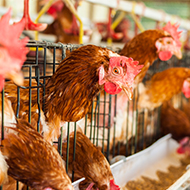Battersea calls for action on breeding for extreme features
French bulldogs are among the brachycephalic breeds which can have health issues.
Battersea is calling on the government to do more to prevent the breeding of dogs with extreme features.
The charity is continuing to see dogs with health and welfare issues linked to their breeding come into its care. In 2023, veterinary surgeons at Battersea performed 78 surgeries on dogs with brachycephalic obstructive airway syndrome to widen their airways.
Coco, a two-year-old French bulldog and Pekingese cross, is one of the brachycephalic dogs that the charity has recently looked after. A cross between two flat-faced breeds, she has bowed front legs and will have mobility issues for the rest of her life. She can also struggle to breathe and has suspected heart arrhythmia.
A new home has now been found for Coco, but she will need to receive ongoing care.
Battersea wants to see tighter regulations on dog breeding and existing enforcement powers to be fully utilised to improve animal health and welfare.
The charity has welcomed the new pet smuggling bill introduced to Parliament by veterinary surgeon Danny Chambers MP. Among other restrictions, the legislation will make it illegal to bring dogs into the UK that are younger than six months or more than 42 days pregnant.
Shaun Opperman, Battersea’s head veterinary surgeon, said: “It’s deeply concerning that animals like Coco are still being bred with such exaggerated traits that directly affect their ability to live a comfortable and healthy life.
“Beyond the many health issues, extreme breeding practices also often take away an animal’s ability to behave naturally – many flat-faced dogs can even struggle to go for long walks due to breathing difficulties.
“It’s so sad, as these traits are solely the result of human demand for certain looks, without consideration of the welfare consequences.”
Image © Shutterstock



 An Avian Influenza Prevention Zone (AIPZ) has been introduced across Wales.
An Avian Influenza Prevention Zone (AIPZ) has been introduced across Wales.